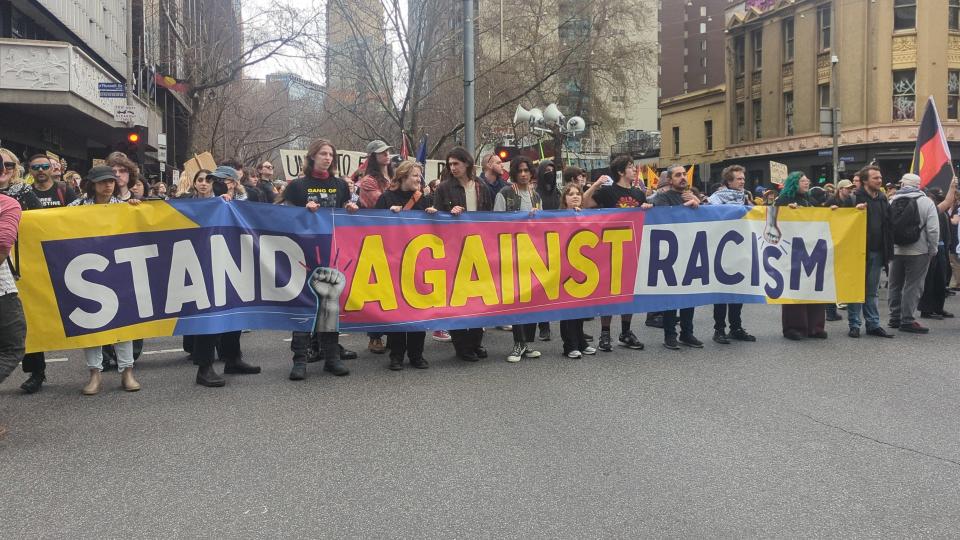How can we defeat the far right?

The “March for Australia” rallies on August 31 mobilised tens of thousands of people — the largest far-right gathering since the rise of Reclaim Australia around 10 years ago. Uniformed neo-Nazis led some of the marches and in a number of cities gave speeches.
As far right watcher Tom Tanuki told Green Left “half the point of these [March for Australia] rallies was to be a blank canvas for them [neo-Nazis] to show up and be welcomed at”.
While the racist rallies were dwarfed by the massive Palestine national day of action a week beforehand, the anti-racist counter mobilisations on August 31 were significantly smaller in many places.
The far-right “Australia Unites” follow-up rallies on September 13 mobilised fewer people – although still substantial numbers. This time anti-racist counter actions, initiated by First Nations people, outnumbered racists in more places.
This could indicate that some supporters of the “March for Australia” rallies were put off by the brazen display of fascist symbols and speakers on August 31 and the violent attack by Nazis on Camp Sovereignty in Naarm/Melbourne.
The anti-racist actions were also better organised.
However, there is a resonance among a section of the population for the racist, anti-immigrant mobilisations.
Another nationwide anti-immigration protest has been planned for October 19. Counter mobilisations are also being organised.
Labor and Liberal/National and Coalition governments have prepared the ground for the rise of the populist right by failing to address the housing crisis, job insecurity and the cost-of-living crisis.
In such times of crisis in mainstream politics, people look for alternatives both on the left and the right. Simplistic arguments such as “migrants are to blame for the housing affordability crisis” will be attractive to some people even though they are utterly false. This becomes even more the case when racist arguments are not rebuffed.
MPs from both major parties fuel the racist fire to divert attention from their own pro-big business housing policies. Former opposition leader Peter Dutton was very explicit about this before the last election, but he’s not the only one.
Labor brought in new laws to make it easier to deport people right after the racist March for Australia. This legitimises far right and racist ideas.
There are many examples of pro-capitalist political parties ceding ground to more right-wing forces. It never works. The right will take the free gifts along with the vindication it seems to give them and then make their demands even more conservative.
This happened when Pauline Hanson was first elected to parliament in 1996. Philip Ruddock, then the Coalition immigration minister, initially rejected Hanson’s policies, such as refusing to allow asylum seekers in boats from ever settling in Australia. Later that became Coalition policy and now it is part of Labor’s.
Labor adopted boat turn-backs and offshore detention — after initially rejecting them — which shifted politics to the right. All of us, not just refugees, have suffered as a result.
We have seen similar processes in Britain and other countries.
It would be a mistake to ignore the far-right threat represented by March for Australia and neo-Nazi organisations, such as the National Socialist Network. We do need to organise counter demonstrations whenever they attempt to mobilise.
But, just as important is building a fight-back to the official racism of Labor and Liberal governments. This includes challenging their open racism, such as Queensland Premier David Crisafulli’s repeated derogatory references to First Nations children, or Peter Dutton’s earlier scaremongering about Sudanese “gangs”.
We also need to build stronger and more militant trade unions and broader popular support for defeating and reversing racist Labor and Liberal laws, such as boat turn-backs and laws criminalising First Nations youth.
Challenging mainstream racism undercuts the fertile ground on which more far-right forces survive.
While some might draw comfort from signing petitions to deport racist figures like New Zealand born Thomas Sewell and banning neo-Nazi groups, it makes easier for the far right to present themselves as martyrs. It also sets a precedent for the state to use such tactics against progressives.
Alongside counter mobilisations to the racists, we need to keep our focus on building the movement against Australia’s complicity in Israel’s genocide in Gaza. This movement is, among other things, a global solidarity and anti-racist movement. It says we care equally about the lives of everyone on the planet and we refuse to allow Western governments to allow an ethnostate to wipe out Palestinians or anyone else.
Finally, we need to provide real solutions to the housing and cost of living crises. Linked to this is the need to provide system-wide answers to those who are now seeing the crisis of contemporary genocidal capitalism.
Ultimately, this means building the socialist movement, even if not everyone realises that yet.
Growing the activist base in socialist organisations and the numbers of people who read socialist publications, is not a side issue. It is a practical and essential aspect of challenging the far-right threat today.
[Alex Bainbridge is a member of the Socialist Alliance National Executive.]